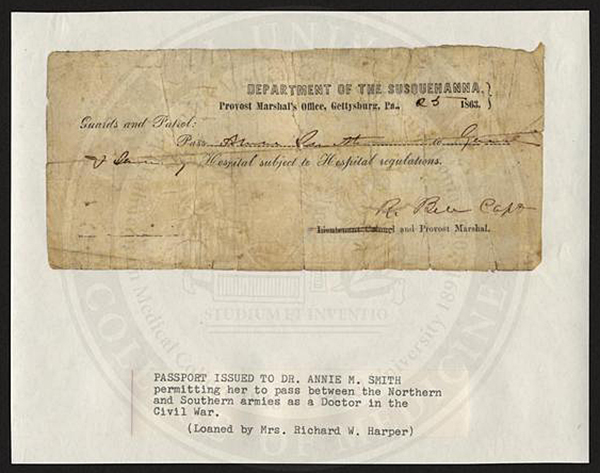From the Collections: Civil War Doctors
by Lisa Grimm
We recently had a research request regarding women physicians and their role in the Civil War. At least two Woman's Medical College of Pennsylvania graduates and one student provided medical care on the battlefields. While not a WMC graduate, we also have a large collection related to Dr. Mary Edwards Walker, who was perhaps the most famous American woman doctor of the Civil War era - although she was not necessarily best known for her medical skills.
The first doctor for whom we have records, Dr. Orianna Moon-Andrews, graduated with her MD in 1857; at that time, the school was still known as the Female Medical College of Pennsylvania. She had married fellow Southerner Dr. John Summerfield Andrews in 1861 and began to serve as his nurse (at least so far as the records show, although other research suggests she did considerably more than some of the medical men of the time cared to admit).
The second of 'our' doctors, Dr. Chloe Annette Buckel, graduated in 1856. She left a role as a physician at the New York Infirmary to volunteer her services and was chosen to select and train nurses for the Union army - apparently the North was equal to the South in not wanting to employ qualified women as physicians. She later relocated to California as a practicing doctor, where she wrote scientific articles and was an advocate for children.
Although not a graduate, Anne Smith was a student at WMC after the Civil War; however, it was her war work that brought this particularly interesting item of ephemera to our archives. The pictured permission pass allowed her to pass between the Northern and Southern armies - it seems likely she was working as a nurse at Gettysburg and possibly other major battlefields. Unfortunately that's about all we know about Smith - we'd certainly be grateful to get more information.

Last but certainly not least was Dr. Mary Edwards Walker; we have approximately 30 linear feet related to Walker including much of her correspondence and an unpublished manuscript about her life (as well as many photographs). Walker was eventually given the Medal of Honor (although it was later revoked and restored), but for most of her working life she was the subject of great controversy. Although many of her male 'colleagues' wanted rid of her, she was eventually given a commission as a surgeon. She was also captured by the Confederate army as a spy and held for a number of months. After the war, she became notorious for dressing in men's clothes (even the dress reform movement wasn't sure what to do with her) and was even arrested on occasion as a result. Syracuse University holds her papers - I'm betting they have the other halves of some of the letters in our collection.

Anyone want to write a grant?